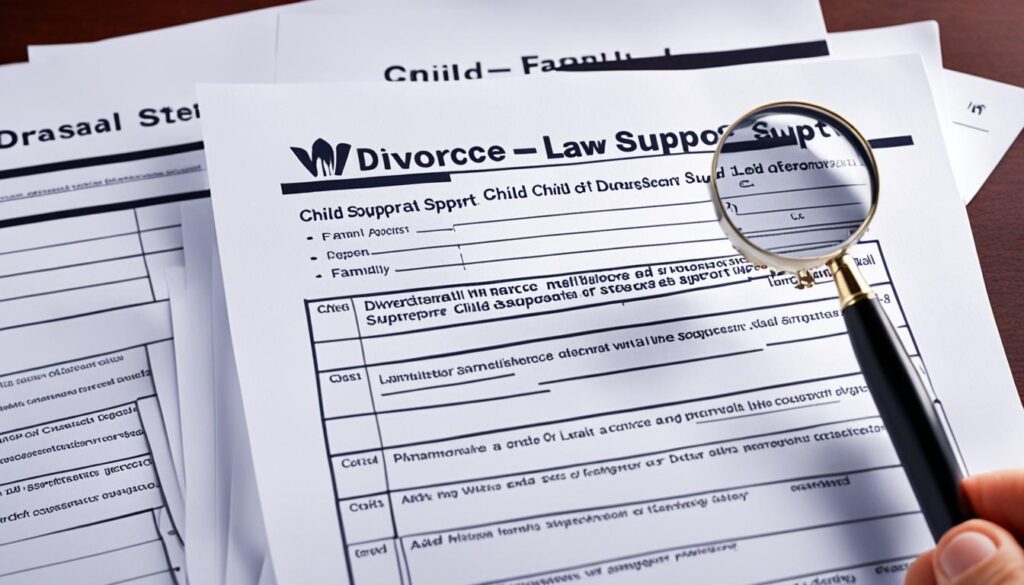When it comes to family law matters, sensitivity and care are of utmost importance. These cases often involve sensitive legal issues that can have a significant impact on the lives of individuals involved. Whether it’s child custody, divorce, or other familial disputes, handling these matters requires a delicate balance between legal expertise and emotional intelligence.
In this section, we will explore the importance of navigating family law matters with sensitivity and provide essential insights for effectively handling these sensitive legal issues. By understanding the nature of these matters, approaching them with empathy and discretion, building the right legal team, and seeking specialized assistance when needed, you can navigate these sensitive situations with confidence.
Key Takeaways:
- Family law matters require a sensitive approach due to their personal and emotional nature.
- Empathy and discretion are essential when dealing with sensitive legal issues.
- Building the right legal team with qualities such as empathy and emotional intelligence is crucial.
- Specialized assistance, such as domestic violence lawyers, can provide necessary support in sensitive cases.
- Alternative dispute resolution methods like mediation can be effective in resolving family law matters.
Understanding the Nature of Sensitive Legal Matters
The Personal and Emotional Stakes in Family Law
Sensitive legal matters, particularly those involving family law, have personal and emotional stakes for the individuals involved. When it comes to family law, the issues at hand often touch upon the very core of people’s lives. Custody battles, divorce proceedings, and asset division can leave a lasting impact on their personal relationships, financial stability, and overall well-being.
For the parties involved, the outcomes of these legal matters can shape their future, both individually and as a family unit. The decisions made during these sensitive legal processes can affect child custody, visitation rights, and financial support. The emotional stakes are high, as families undergo significant changes and transitions.
Empathy and Legal Expertise as Key Approaches
When dealing with sensitive family law matters, it is essential to approach the situation with empathy and legal expertise. Empathy allows legal professionals to understand the emotions that come with these sensitive issues and to relate to the challenges faced by their clients. It creates a safe space for individuals to share their concerns and express their needs.
Moreover, legal expertise in family law is crucial to navigating the complexities of these cases effectively. A knowledgeable and experienced attorney will have a deep understanding of the legal framework surrounding family law matters and can provide expert guidance tailored to each client’s specific circumstances. They can help their clients make informed decisions while considering both the emotional and legal aspects of their case.
“Empathy is about standing in someone else’s shoes, feeling with his or her heart, seeing with his or her eyes. Not only is empathy hard to outsource and automate, but it makes the world a better place.” – Daniel Pink
Family law cases often require delicate handling and careful consideration of the parties’ personal and emotional stakes. By combining empathy and legal expertise, legal professionals can provide the support and guidance necessary to guide their clients through these challenging times.
| Benefits of Empathy and Legal Expertise in Sensitive Legal Matters | |
|---|---|
| Understanding clients’ unique needs and concerns | Providing emotional support throughout the legal process |
| Creating a safe and non-judgmental environment for clients | Developing a customized legal strategy |
| Helping clients make informed decisions | Advocating for clients’ best interests |
Approaching the Situation with Empathy and Discretion
When dealing with sensitive legal matters, it is crucial to approach the situation with empathy and discretion. This means understanding the emotions of all parties involved and navigating them carefully without compromising the legal strategy.
Empathy plays a significant role in sensitive legal matters as it allows you to connect with the individuals involved on a deeper level. By putting yourself in their shoes, you can better understand their perspectives, emotions, and concerns. This understanding can guide you in making decisions and taking actions that are considerate of their needs and wellbeing.
“Empathy is about standing in someone else’s shoes, feeling with his or her heart, seeing with his or her eyes. Not only is empathy hard to outsource and automate, but it makes the world a better place.” – Daniel H. Pink
Additionally, discretion is essential when handling sensitive legal matters. It involves maintaining confidentiality to protect the privacy of all individuals involved. By ensuring that sensitive information remains confidential, you create a safe and trusted space for your clients.
Confidentiality is not only important ethically but also legally. Attorney-client privilege ensures that communications between an attorney and their client remain confidential, allowing clients to speak freely and openly without fear of their information being disclosed.
Moreover, discretion also means being mindful of the potential impact of your actions and words on the emotions and well-being of the parties involved. By exercising discretion, you can guide the legal process in a way that minimizes further emotional distress and preserves the dignity of all individuals involved.
In conclusion, approaching the situation with empathy and discretion is essential in navigating sensitive legal matters. By understanding the emotions of all parties involved and maintaining confidentiality, you can create a supportive environment and effectively manage the legal process with sensitivity and professionalism.

Building the Right Legal Team
When it comes to dealing with sensitive family law matters, building the right legal team is essential. The complexity of these cases requires attorneys who not only possess strong legal skills but also demonstrate empathy and emotional intelligence.
Qualities of an Effective Family Law Attorney
An effective family law attorney is someone who understands the unique dynamics of family law and the emotional impact it has on individuals involved. They have the ability to navigate through the intricacies of the legal system while providing support and guidance to their clients.
Some key qualities of an effective family law attorney include:
- Empathy: A family law attorney with empathy is able to understand and relate to the emotions and challenges faced by their clients. This enables them to provide compassionate and personalized legal advice.
- Strong Legal Skills: In addition to empathy, an effective family law attorney possesses a strong foundation of legal knowledge and skills. They understand the nuances of family law and are adept at formulating strategies that protect the best interests of their clients.
- Emotional Intelligence: Emotional intelligence is vital in family law cases where emotions often run high. An attorney with emotional intelligence can manage their own emotions and effectively communicate with all parties involved, promoting a more amicable and productive resolution.
An effective family law attorney combines these qualities to ensure their clients receive the best possible representation and support throughout the legal process.
Family Law: Between Legal Skills and Emotional Intelligence
Family law sits at the intersection of legal skills and emotional intelligence. It requires attorneys to not only be well-versed in the complexities of the law but also have a deep understanding of the emotional dynamics involved.
Emotional intelligence enables family law attorneys to:
- Handle sensitive conversations and negotiations with care and empathy.
- Anticipate and address the emotional needs of their clients.
- Effectively communicate complex legal concepts in a way that is easily understood by their clients.
- Support their clients through the emotional challenges that arise during the legal process.
By balancing legal skills with emotional intelligence, family law attorneys create a safe and supportive environment for their clients, guiding them towards the best possible outcomes in their cases.
Seeking Specialized Assistance
In certain situations, seeking specialized assistance is necessary when dealing with sensitive family law matters. Domestic violence lawyers can provide specialized support and guidance in cases involving allegations of domestic abuse.
Domestic violence lawyers are experienced legal professionals who understand the unique challenges and complexities of domestic violence cases. They can help victims navigate the legal system and ensure their rights are protected. These lawyers have the expertise to gather evidence, build a strong case, and advocate for their clients in court.
In addition to legal representation, domestic violence lawyers can also assist in obtaining protective orders. Protective orders, also known as restraining orders, are legal documents issued by the court to protect individuals from further harm or abuse. These orders can provide a sense of safety and security by restricting the abuser’s contact with the victim and establishing clear boundaries.
When it comes to sensitive family law matters, specialized assistance can make a significant difference in the outcome of the case. By working with domestic violence lawyers and seeking protective orders, individuals can take proactive steps to ensure their safety and well-being.
Utilizing Alternative Dispute Resolution Methods
When it comes to resolving sensitive family law matters, alternative dispute resolution methods can provide effective solutions. One such method is mediation, which allows for open communication and collaboration between the parties involved. Through mediation, individuals can work together to reach mutually satisfactory agreements, promoting more amicable resolutions.
The Role of Mediation in Family Law
Mediation plays a critical role in family law cases as it offers a structured and facilitated process for resolving disputes. With the assistance of a trained mediator, both parties have the opportunity to express their concerns and explore potential solutions in a neutral and safe environment. Mediation allows individuals to address their interests, needs, and concerns directly, promoting a deeper understanding and potential compromise.

Comparing Litigation and Arbitration in Sensitive Cases
In sensitive family law cases, it is essential to consider the alternatives to traditional litigation. Litigation is a court-based process where a judge makes the final decisions, which may not always align with the interests of both parties. Furthermore, litigation is often time-consuming, costly, and adversarial in nature.
Arbitration is another alternative dispute resolution method that can be used in sensitive cases. It involves the appointment of a neutral third party who acts as an arbitrator and makes legally binding decisions based on the evidence and arguments presented. While arbitration can provide a faster resolution compared to litigation, it may not offer the same level of control over the outcome as mediation.
By comparing these alternative dispute resolution methods, individuals involved in sensitive family law cases can make informed decisions about the most suitable approach for their specific needs. Mediation, with its focus on cooperation and communication, often proves to be a valuable tool in achieving mutually satisfactory outcomes while preserving important relationships.
Accessing Support Resources
Navigating sensitive family law matters can be emotionally challenging. It is important to recognize that you do not have to face these challenges alone. Accessing support resources can provide the emotional and legal support you need throughout the process.
When dealing with the complex and sensitive nature of family law issues, it can be helpful to seek assistance from professional counseling services. Professional counselors trained in family law matters can provide a safe and supportive space for you to express your emotions and navigate the difficult decisions you may face.
Support groups can also be valuable resources during this time. Connecting with others who are going through or have been through similar situations can provide a sense of comfort, understanding, and solidarity. These groups can offer valuable insights, coping strategies, and a network of emotional support.
Additionally, there are organizations that specialize in family law and can offer guidance and assistance. These organizations often have resources, information, and referrals to trusted legal professionals who can address your specific needs. They can provide you with the knowledge and support necessary to make informed decisions about your case.
Remember, seeking support is a sign of strength, not weakness. Taking care of your emotional well-being is essential, and accessing these valuable support resources can help you navigate the complexities of family law matters with greater resilience and confidence.
Documenting Everything
When it comes to sensitive family law matters, proper documentation is absolutely crucial. By maintaining a comprehensive record of interactions, agreements, and incidents, you can provide valuable evidence in the event that your case proceeds to court. It is essential to keep copies of emails, text messages, legal documents, and any other relevant communications to support your claims and substantiate your position.
Documenting everything serves as a strong foundation for your legal proceedings, allowing you to present factual evidence that can greatly influence the outcome of your case. These records can help establish the sequence of events, clarify any misunderstandings, and provide key insights into the circumstances surrounding your situation.
When documenting, be sure to include dates, times, locations, and the parties involved in each interaction or incident. This level of detail can significantly strengthen your case and help you build a compelling narrative.

Image: Documenting everything is vital in sensitive family law matters.
Staying Informed and Proactive
When dealing with sensitive legal issues in family law, staying informed and proactive is essential. By educating yourself on family law matters and understanding your legal rights, you can make informed decisions and actively participate in your own case. It is vital to collaborate with your legal counsel to ensure a proactive approach to managing your legal affairs.

Education on Family Law Matters and Legal Rights
Gaining knowledge about family law matters is crucial for anyone navigating sensitive legal issues. By educating yourself on the relevant laws, procedures, and regulations, you can better understand your rights and obligations. Familiarize yourself with the legal terminology, court processes, and available resources to effectively navigate your case.
Active Participation and Collaboration with Legal Counsel
Active participation in your case is key to achieving favorable outcomes in family law matters. Work closely with your legal counsel, providing them with all the necessary information, documents, and evidence. Maintain open communication with your lawyer, discussing your concerns, goals, and any new developments. Collaborating with your legal team ensures that your voice is heard and your interests are well-represented throughout the legal process.
Emphasizing Clear Communication
Clear and effective communication plays a crucial role in navigating sensitive family law matters. It is essential to have open and honest dialogue with all stakeholders involved, including the other party, lawyers, and professionals. By implementing effective communication strategies, you can manage legal affairs more efficiently and resolve conflicts more constructively.
Effective Dialogue with Stakeholders
When dealing with sensitive family law matters, effective dialogue with stakeholders is of utmost importance. By engaging in meaningful conversations, you can establish a common understanding, address concerns, and work towards mutually beneficial solutions. Active listening and clear articulation of your needs and expectations can help foster cooperation and build trust among all parties involved.
Communication Strategies in Managing Legal Affairs
Implementing communication strategies is a valuable approach in managing sensitive legal affairs. Consider the following strategies:
- Clarity: Ensure your communication is clear and concise, using plain language to avoid confusion or misinterpretation.
- Timeliness: Respond promptly to all communication, respecting the urgency of the matter and demonstrating your commitment to a productive dialogue.
- Confidentiality: Respect the sensitive nature of legal matters and maintain confidentiality to protect the privacy and integrity of all involved parties.
- Respect and Professionalism: Always approach communication with respect and professionalism, even in contentious situations. Avoid inflammatory language or disrespectful remarks that may aggravate conflicts.
- Written Documentation: Keep written records of all communication, including emails, letters, and text messages, as they may serve as evidence in legal proceedings.
By implementing these communication strategies, you can foster a more transparent and constructive dialogue, reducing misunderstandings and mitigating potential conflicts.
Prioritizing Your Well-being
When navigating sensitive family law matters, it is essential to prioritize your well-being. The stress and emotional challenges involved can take a toll on your mental and physical health. Taking care of yourself through self-care activities, seeking support, and maintaining a healthy lifestyle can help you navigate the legal process with resilience.
Self-care activities such as exercise, meditation, and engaging in hobbies that bring you joy can greatly contribute to your overall well-being. It is important to set aside time for activities that help you relax and recharge, allowing you to better cope with the demands of handling sensitive legal matters.
Additionally, seeking support from trusted friends, family members, or professional counselors can provide you with the emotional support and guidance you may need during this challenging time. Talking to others who have gone through similar experiences can offer valuable insights and help you feel less isolated.
Maintaining a healthy lifestyle by eating nutritious meals, getting enough sleep, and managing stress is crucial for both your physical and emotional health. Prioritizing self-care and setting boundaries can help you better manage the emotional toll that family law matters can have on your well-being.
Conclusion
In navigating family law matters, it is crucial to approach them with empathy, clear communication, and proactive strategies. By understanding the personal and emotional stakes involved, you can better navigate the complexities of sensitive legal issues. Seek specialized assistance when needed, such as from domestic violence lawyers or experts in family law, who can provide the support and guidance necessary.
Utilizing alternative dispute resolution methods, like mediation, can contribute to more amicable resolutions and open communication between parties. This approach allows for a collaborative and constructive environment, reducing the strain and animosity often associated with litigation. Additionally, prioritize your well-being by engaging in self-care activities and seeking emotional support throughout the legal process.
By implementing these strategies, you can effectively handle sensitive family law matters and ensure the best possible outcome for all parties involved. Remember, clear communication and proactive engagement with legal counsel are essential for staying informed and taking an active role in managing your legal affairs. Through this approach, you can navigate the complexities of family law matters with resilience and resolve.
FAQ
Why is empathy important when navigating sensitive family law matters?
Empathy is crucial when dealing with sensitive family law matters because it allows individuals to understand and acknowledge the emotions and experiences of all parties involved. It helps create a more compassionate and cooperative atmosphere, which can result in more amicable resolutions.
How can I approach sensitive legal matters with empathy and discretion?
Approaching sensitive legal matters with empathy and discretion involves understanding the emotions of all parties and treating them with sensitivity. It also means ensuring that confidentiality is maintained to protect the privacy of individuals involved.
What qualities should I look for in a family law attorney?
When choosing a family law attorney, look for qualities such as empathy, strong legal skills, and emotional intelligence. A good family law attorney will be able to navigate the complexities of family law while understanding the emotional dynamics involved in sensitive cases.
When should I seek specialized assistance for family law matters?
Specialized assistance, such as domestic violence lawyers, should be sought in cases involving allegations of domestic abuse. These lawyers can provide support and guidance, helping individuals understand their rights and obtain protective orders to ensure their safety and well-being.
What are the benefits of alternative dispute resolution methods in family law cases?
Alternative dispute resolution methods, such as mediation, can be effective in resolving sensitive family law matters. Mediation allows for open communication and collaboration between all parties involved, leading to more amicable resolutions. It can help avoid the adversarial nature of litigation and the potential lack of control in arbitration.
How can I access support resources for sensitive family law matters?
You can access support resources by seeking counseling services, joining support groups, and reaching out to organizations specializing in family law. These resources can provide both emotional and legal support throughout the process.
Why is documentation important in sensitive family law matters?
Proper documentation, such as keeping a detailed record of interactions, agreements, and incidents, is crucial in sensitive family law matters. It provides valuable evidence that can support your case if it goes to court. This includes maintaining copies of emails, text messages, legal documents, and any other relevant communications.
How can I stay informed and proactive in family law matters?
Staying informed about family law matters and your legal rights is important when navigating sensitive issues. Educate yourself on family law to make informed decisions and actively participate in your own case. Collaboration with your legal counsel is also essential for a proactive approach to managing your legal affairs.
How can I emphasize clear communication in sensitive family law matters?
Clear communication is essential when dealing with sensitive family law matters. Effective dialogue with all stakeholders, including the other party, lawyers, and professionals, can help manage legal affairs more efficiently and resolve conflicts more constructively. Implementing communication strategies, such as active listening and respectful communication, can foster better understanding and cooperation.
How can I prioritize my well-being when navigating sensitive family law matters?
Prioritizing your well-being is vital when dealing with sensitive family law matters. The stress and emotions involved can take a toll on your mental and physical health. Ensure you take care of yourself through self-care activities, seek support from friends and professionals, and maintain a healthy lifestyle to navigate the legal process with resilience.
Source Links
- https://amazelaw.com/navigating-sensitive-legal-issues-essential-tips-and-resources/
- https://familylawyersmackay.com.au/navigating-complex-family-law-matters-tips-strategies/
- https://www.tucker.legal/navigating-family-law-understanding-your-rights-and-options

